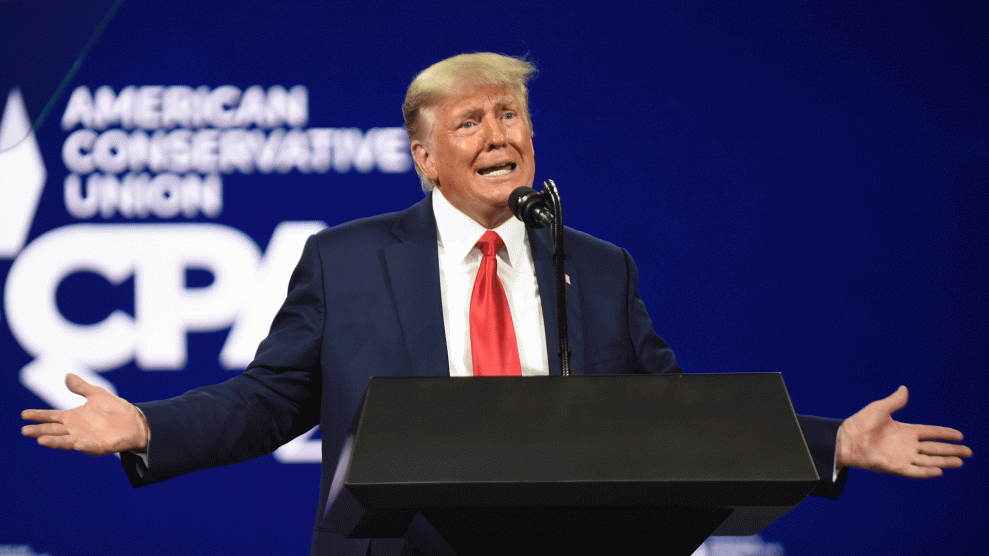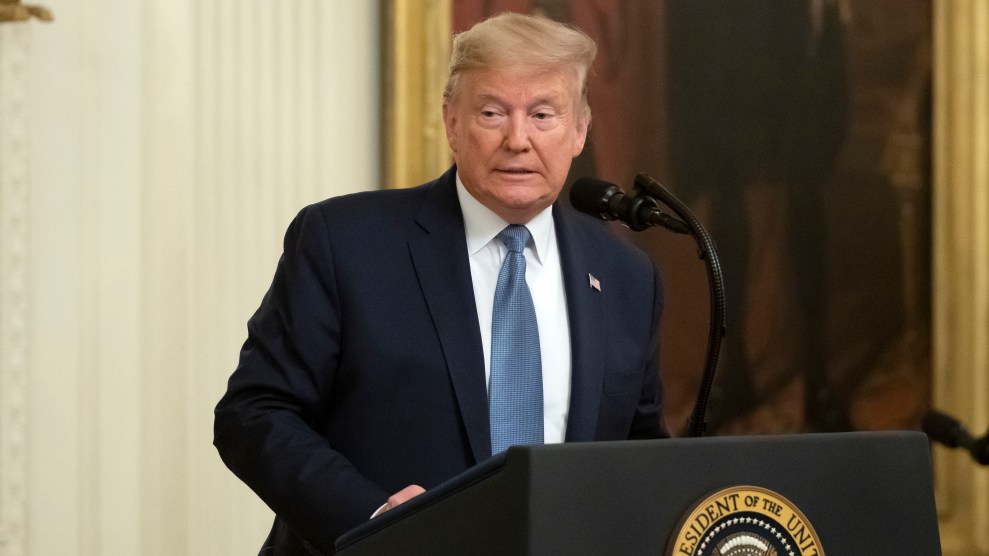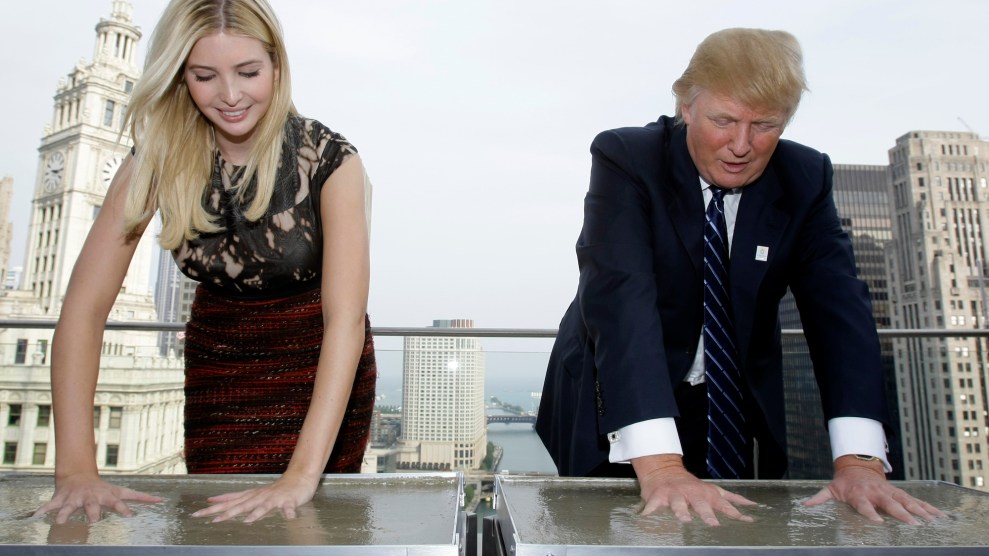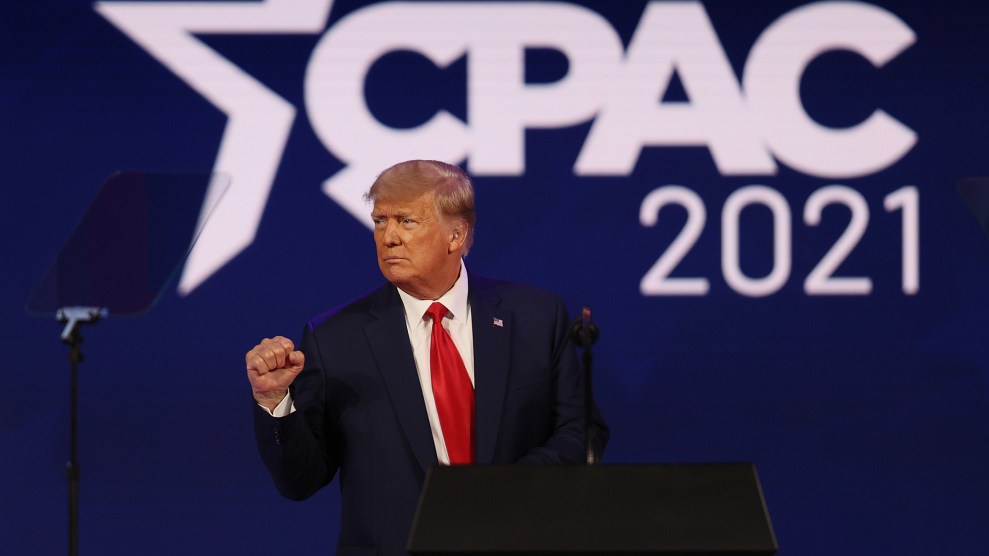
Paul Hennessy/AP
Imagine being in a position to save tens of thousands of lives—perhaps hundreds of thousands—and not doing so? That’s one of the core questions that remain in the wake of the Trump presidency. The guy in charge could have prevented the deaths of so many Americans just by advocating and reaffirming basic public health guidances, such as mask-wearing, and he chose not to. Last month, the Lancet Commission on Public Policy and Health in the Trump Era declared that about 40 percent of the nation’s COVID-19 deaths could have been averted had the United States taken these fundamental steps, and it offered a damning verdict: Donald Trump’s “inept and insufficient” response to the coronavirus crisis was partly to blame. That is, while Trump was in office, his actions—or inactions—killed many Americans. And out of office, he remains a threat to the public health of the nation.
Forty-nine percent of Republican men in a recent poll said they do not intend to get the coronavirus vaccination. Throw GOP women into the mix and that number is 41 percent. As of mid-February, 26 percent of Americans identified themselves as Republicans, down from 30 percent at the time of the November election. If these number are accurate, that means that the bloc of Republicans saying no to the COVID vaccine could represent about 10 to 12 percent of the adult population. (Yes, there are Democrats and independents who won’t take a shot, but their numbers are lower.) And this is not just about them. The refusal of these people to be vaccinated could impede the achievement of herd immunity. There is no known magic number of vaccinations that will yield that level of communal protection, but the vaccination rates needed for herd immunity for COVID range between 70 and 95 percent. GOP vaccination denial could undermine the effort to fully defeat the pandemic.
This is where Trump comes in. Why are all these Republicans—especially men—refusing to be shot up with one of the approved vaccines? A huge part of the answer is related to the political culture on the right. Trump has spent years pushing specific conspiracy theories and playing footsie with others. He has a history of vaccine skepticism, and a 2020 study, published in the Journal of Experimental Social Psychology, found that Trump voters in 2016 were particularly prone to anti-vaccination attitudes and that Trump’s tweets in some cases intensified these sentiments. Throughout the COVID crisis, Trump’s supporters have attacked public health experts, such as Dr. Anthony Fauci, and accused him and others of nefariously using the pandemic to limit Americans’ freedoms or to further even more diabolical plots. Big-time conspiracy peddler Alex Jones, who was a VIP guest at the GOP’s 2016 convention, has claimed the coronavirus crisis was a “globalist scheme” to impose one-world government. If you couldn’t trust Fauci and his fellow scientists about masks—and Trump indicated he didn’t—why should you trust them now about the vaccine?
Trump never took steps to beat back the paranoia, which certainly colors how some of his devotees now view vaccinations. Moreover, last month, CNN reported that the anti-vaccination movement had somewhat merged with the so-called “Stop the Steal” crusade, which falsely claims Trump won the 2020 election. “The anti-vaccine message,” CNN noted, “may have found a particularly receptive audience among some fervent Trump supporters, many of whom flout wearing masks and contend the lethality of the virus is overblown.”
The bottom-line: Trump helped create the political petri dish in which the current anti-vaccination virus has grown. And Another factor in this poisonous mix is Fox News. Last week, host Tucker Carlson derided President Joe Biden’s campaign to vaccinate the entire country, claiming (falsely) the “military will give you that shot” and depicting those seeking vaccinations as people willing to be “obedient” to Biden. Well, which Fox viewers want to bend the knee before Biden?
So it was not surprising when Fauci went on Fox this past weekend and essentially begged Trump to appeal to his folks to get a shot. “I think it would make all the difference in the world,” he said. Fauci even tried to exploit Trump’s well-known vanity, remarking that Trump “is a such a strongly popular person…It would be very helpful for the effort for that to happen.”
Trump has yet to respond. While former presidents Jimmy Carter, George W. Bush, Bill Clinton, and Barack Obama—and their wives—have all joined an ad campaign to spur COVID vaccination, Trump has stayed on the sidelines. He and Melania Trump received their vaccinations in January in private, without public comment. Sharing their vaccination experience with the world could have conveyed a powerful message to MAGAWorld’s skeptical denizens. But the Trumps did not use the occasion to push others to seek vaccination. Instead, Trump has allowed vaccine hesitancy to fester among his supporters.
Yet Trump wants credit. Last week, the banned-from-Twitter ex-president issued a statement in search of personal glory: “I hope everyone remembers when they’re getting the COVID-19…Vaccine, that if I wasn’t President, you wouldn’t be getting that beautiful ‘shot’ for 5 years, at best, and probably wouldn’t be getting it at all. I hope everyone remembers!” (Don’t ask why “shot” is in quotation marks.) Naturally, this statement was false. The first vaccine approved, the one developed by Pfizer, was not created under the auspices of Trump’s Operation Warp Speed, and other countries developed vaccines within a year. But here was Trump desperately attempting to elbow his way into the picture, as the Biden crew was ramping up vaccination production and delivery and showing how a competent, guided-by-science administration can operate.
While grabbing for credit, Trump, though, was not willing to take the obvious companion step: encourage vaccination. Why not? One possible explanation: he is a man propelled by spite and revenge. Before becoming president, he often gave lectures on the secrets of his supposed success. During those talks, he described his top rule for doing business this way: “Get even with people. If they screw you, screw them back 10 times as hard. I really believe it.” A fellow like that—a devotee of revenge—may be incapable of assisting the man who beat him, even if that means thousands of Americans will suffer.
Beyond psychological resistance, there is another likely reason: Were Trump to join the chorus of public figures touting the benefits and safety of the COVID vaccination, he would be boosting Biden’s top priority and helping Biden’s presidency become a success. Such a move would not advance Trump’s political interests. If he is considering a 2024 rematch, he won’t want Biden to be the COVID hero. And having fueled and exploited right-wing paranoia—throughout the pandemic and during the post-election period—to build and expand his political base, why would Trump throw that all away? A call from Trump to get vaccinated could appear to some of his loyalists as unsettling counter-programming. Now we’re supposed to do what Fauci says? How discombobulating would that be? It would cut against Trump’s embrace of anti-elite know-nothingism. He would be conceding that Biden and the Fauci-huggers were right all along. After all, how can you own the libs if you acknowledge they are right about the vaccine?
The election showed that tens of millions of Americans don’t give a damn what the experts say. They had watched Trump respond to the crisis by defying the demands that he endorse and champion basic public health measures—and they were fine with that. They relished his politicization of the pandemic. They don’t want a pivot, and Trump doesn’t do pivots. By declining to join the campaign to promote vaccination, Trump is encouraging the dark suspicions toward the vaccine within Trump Nation. That probably means more Americans will suffer and die. Trump doesn’t seem to care about that. Then again he never did. Trump is now just staying true to the brand—and he would rather protect that than save lives.
















